- Home
- Robin Hobb
Renegades Magic Page 2
Renegades Magic Read online
Page 2
The sword burned me. It all but jumped from my hand when I let go of the hilt, as if magnetically repelled from me, and clattered to the floor. I choked on the mouthful of dry crumbs and sank to the floor, gasping and gripping the wrist of my offended hand. When I looked at my palm, it was as red as if I’d gripped a nettle. I shook my hand and wiped it against my trouser leg, trying to be free of the sensation. It didn’t pass. The truth came to me.
I had given myself to the magic. Cold iron was mine no longer.
I stood slowly, backing away from my fallen sword and a truth I was reluctant to face. My heart was hammering in my chest. I’d go weaponless into the forest. Iron and the technology that it made possible was mine no longer. I shook my head like a dog shaking off water. I wouldn’t think about it just now. I couldn’t quite grasp all it would mean, and at that moment I didn’t want to.
I gave a final glance around the cabin, realizing belatedly that I’d enjoyed living here, on my own, having things my own way. It was the only time in my life I’d had such freedom. I’d gone from my father’s house straight to the Academy, and then returned to his domain. Only here had I ever lived as my own master. When I left here, I’d begin a life not as a free man, but as a servant to a foreign magic that I neither understood nor wanted.
Page 5
But I’d still be alive. And the people I loved would go on with their lives. I’d had a glimpse, when the mob seized me, of a far worse future, a future in which Amzil’s best hope was that the gang rape would leave her alive and Spink’s that he would survive having his troops turn on him. My own death paled in comparison. No. I’d made the best choice for all of us. Now it was up to me to move on, keeping whatever shreds of my integrity remained. I wished I wasn’t going into my new life so empty-handed. I looked longingly at my knife and my axe. No. Iron was not my friend anymore. But my winter blanket, folded on the shelf, I would take. One final glance around the cabin, and then I left, shutting the door firmly behind me on Kesey’s rattling snore.
As I came out Clove lifted his head and gave me a rebuking stare. Why hadn’t I freed him from his harness to graze? I glanced at the sun. I’d leave him here, I decided. It was believable that if the big horse had got loose in Gettys, he’d come back to his stall. I couldn’t take off his tack; someone would wonder who had done that for him. I hoped whoever took him over would treat him well. “Stay here, old chum. Kesey will look after you. Or someone will. ” I gave him a pat on the shoulder and left him there.
I walked across the cemetery grounds that I knew so well. I passed the butchered remains of my hedge. I shuddered as I recalled it as I’d last seen it, with the bodies jerking and twitching as the rootlets thrust into them seeking nutrients and for a moment I was plunged back into that torchlit night.
It was rare but not unknown for a person who died of Speck plague to be a “walker. ” One of the doctors at Gettys believed that such persons fell into a deep coma that mimicked death, to rouse hours later for a final attempt at life. Few survived. The other doctor, an aficionado of the superstitions and psychic phenomena that so fascinated our Queen, believed that such “walkers” were not truly the folk who had died, but only bodies reanimated by magic to bring messages to the living from the beyond. Having been a “walker” myself, I had my own opinions. In my year at the King’s Cavalla Academy, I’d contracted the Speck plague just as my fellow cadets had. Once I’d “died,” I’d found myself in the Specks’ spirit world. There I’d done battle with my “Speck self” and Tree Woman, returning to life only after I had defeated them.
My erstwhile fiancée Carsina had also been a “walker. ” In my final night as cemetery guard she had left her coffin and come to beg my forgiveness before she could rest in death. I’d wanted to save her. I’d left my cabin, intending to ride to town and get help. Instead, I’d seen an unimaginable sight. Other plague victims had risen and sought out the trees I’d inadvertently planted. I’d known they were kaembra trees, the same sort of trees that the Specks claimed as their ancestor trees. I’d known that when I’d seen the poles leaf out. How could I not have realized the danger? Had the magic blinded me to it?
Each “walker” had sought out a tree, had sat down, backs to the trunks, and then cried out in agony as the hungry little trees had sent rootlets thrusting into flesh. I’d never forget what I’d seen that night. A boy had cried out wildly, his head and arms and legs jerking spasmodically as the tree claimed his flesh and bound his body tightly to its trunk. I’d been unable to do anything for him. But the worst had been the woman who cried out for help and held her hands out beseechingly. I had clasped those hands and tried with all my might to pull her back, not from death, but from an extended life that made no sense to a Gernian soul.
I’d failed.
I remembered well which tree had seized her so irrevocably, thrusting roots into her back, roots that would burst into a network of spreading filaments inside her, sucking into the young trees not just the nutrients in her body, but her spirit as well. That was how the Specks created their ancestor trees. Those the magic found worthy were rewarded with such trees.
As I passed the hacked stump of the woman’s tree, I noticed that it had already sent up a questing new sprout. On the stump next to hers, a red-wattled croaker bird perched, watching me intently. It opened its wings and thrust its ugly head at me. Its wattles shook as it croaked accusingly at me. I shuddered. Croaker birds were the emblem of Orandula, the old god of death and of balances. I did not wish another encounter with him. As I fled from it, I realized that Clove was following me. Well, he’d soon turn back. I entered the forest and felt it take me in. It was like a curtain swishing closed behind me, signaling that the first act of my life was over.
This part of the forest was young, a regrowth after a fire. Occasionally, I passed a blackened stump overgrown with moss and ferns, or strode through the shade of a scorched giant who had survived that blaze. Bushes and wildflowers grew here in the sunlight that filtered down between the trees. Birds sang and darted from branch to branch in the early morning light. The sweet scents of the forest rose up to surround me. Tension drained from me. For a time I walked without thought, listening to Clove’s hooves thud dully on the deep forest soil as he trailed after me.
Page 6
It was a pleasant summer day. I passed two white butterflies dancing together above a small patch of wildflowers. Beyond them, I came to a mounded tangle of blackberry vines competing for light in a small clearing. I stopped and gathered a double handful of the lush, black summer fruit. They burst in my fingers and stained my hands as I picked them. I filled my mouth with them, rejoicing in the sweetness that was both taste and aroma. I ground the tiny seeds between my back teeth, savoring them. Fruit such as this could take the edge off my hunger, but it could not satisfy me. No. As the magic had come to dominate my flesh and blood, I had learned to crave the foods that fed it. That was what I wanted now. I left the berry patch, hastening uphill.
The burned-over forest gave way to ancient forest with shocking suddenness. I paused at the edge, standing in the dappling sunlight among the younger trees, and looked into a dark cavern. The roof was a thick mass of intertwining branches. Ranks and columns of immense trunks marched off into the dimness. The dense overhead canopy absorbed and defeated the summer sunlight. There was very little underbrush. Thick moss floored the world, indented with a seemingly random pattern of animal trails.
I sighed and glanced back at the big horse. “This is where we part company, my friend,” I told Clove. “Go back to the graveyard. ”
He regarded me with a mixture of curiosity and annoyance. “Go home,” I told him. He flicked his ears and swished his badly bobbed tail. I sighed. Soon enough, he’d figure it out for himself. I turned and walked away from him.
He followed me for a short way. I didn’t look back at him or speak to him. That was harder than I thought it would be. I tried
not to listen for the dull thud of his hooves. He’d go back to where the grazing was good. Kesey would take him in and use him to pull the corpse cart. He’d be fine. Better off than me. At least he’d know what the world expected of him.
There were no human pathways in this part of the forest. I felt as if I walked through an alien abode, richly carpeted in thick green, beneath an elaborate ceiling of translucent green mosaic, all supported by towering columns of rich wood. I was a tiny figurine set down in a giant’s home. I was too small to matter here; the quiet alone was enough to muffle me out of existence.
But as I hiked on, the quiet reinterpreted itself to me. The noises of men were not here, but it was not silent. I became more aware of the birds that flitted and sang challenges to one another over my head. I heard the sharp warning thud of its hind feet and the muffled scamper of a startled hare. A deer regarded me with wide eyes and spread ears as I passed its resting place. I heard its soft snuff as I passed it.
The day was warm and humid beneath the trees. I paused to unbutton my jacket and the top two buttons of my shirt. It was not too long before I was carrying my uniform jacket slung over my shoulder. Amzil had pieced the cavalla-green coat together for me from several old uniforms to fit my enlarged body. One of the tribulations of my magic-induced weight was that I was constantly uncomfortable in my clothing. Trousers had to be fastened under my gut rather than round my waist. Collars, cuffs, and sleeves chafed me. Socks stretched out and puddled around my ankles, and wore out swiftly at the heel from my excessive weight. Even boots and shoes were a difficulty. I’d gained size all over my body, even down to my feet. Right now, my clothing hung slightly loose on me. I’d used a lot of magic last night, and lost bulk proportionately. For a moment I considered disrobing and simply going naked as a Speck, but I had not left civilization quite that far behind.
My way led me ever upward, over the gently rising foothills. Ahead loomed the densely forested Barrier Mountains and the elusive Speck people who roamed them. I’d been told that the Specks had decided to retreat early to their winter grounds high in the mountains. I’d seek them there. They were not just my last possible refuge. That was also what the magic commanded me to do. I’d resisted it to no avail. Now I would go to it and try to discover what it wanted of me. Was there any way to satisfy it, any way to win free of it and resume a life of my own choosing? I doubted it, but I would find out.
The magic had infected me when I was fifteen. I had, I thought, been a good son, obedient, hardworking, courteous, and respectful. But my father, unbeknownst to me, had been looking for that spark of defiance, that insistence on following my own path that he believed was the hallmark of a good officer. He’d decided to place me in a position where ultimately I must rebel against the authority over me. He had given me over to a Kidona plainsman, a “respected enemy” from the days when the King’s cavalla had battled the former occupants of the Midlands. He told me that Dewara would instruct me in Kidona survival and fighting tactics. Instead, he had terrorized me, starved me, notched my ear, and then, just when I’d found the will to defy both him and my father, endeavored to befriend me. I could never look back on those days without wondering what he had done to my thinking. Only recently had I begun to see the parallels between how Dewara had broken me and brought me into his world and the way the Academy harassed and overburdened the new cadets to press them into a military mold. At the end of my time with Dewara, he had tried to induct me into the Kidona magic. He had both succeeded and failed.
Page 7
I had crossed into the Kidona spirit world to do battle with their ancient enemy. Instead, Tree Woman had captured me and claimed me. From that day forth, the magic had taken over my life. It had dragged, spurred, and coerced me to the frontier. In Gettys, I’d made one last attempt to claim my life as my own. I’d signed my enlistment papers as Nevare Burv, and taken up the only position the regiment offered, guarding the cemetery. Even so, I’d put my heart into my task, doing all I could to see that our dead were buried respectfully and left undisturbed. I’d begun to have a life again; Ebrooks and Kesey had become my friends, and Spink, my cousin’s husband and my best friend from our Academy days, had renewed our friendship. Amzil had come to live in Gettys; I’d dared to hope she felt affection for me. I had begun to make something of myself, even believing I could provide a refuge for my sister from my father’s tyranny.
That life did not serve the magic’s purpose for me, and as Scout Hitch had once warned me, the magic would not tolerate anything that ran counter to its plan for me. It had destroyed Hitch’s life to make him its servant. I knew I had to choose death or serve the magic. Before Hitch died, he’d confessed all to me. Under the magic’s influence, he’d killed Fala, one of Sarla Moggam’s working girls, and left the evidence that would implicate me. He’d done that, despite being my friend, despite being an otherwise upright man. I still could not imagine Hitch strangling poor Fala, let alone betraying me so treacherously. But he had.
I didn’t want to discover what the magic could make me do if I continued to defy it.
CHAPTER THREE
LISANA
My path led me ever upward. Somewhere, I knew, the sun shone and the wind stirred lightly in a soft summer day. But here, beneath the trees, a soft green twilight reigned and the air was still. My footfalls were deadened by decades of leaf mold. Great trees, roots braced and humped against the rise of the hills, surrounded and shaded me, making the forest a many-pillared palace. Sweat ran down my face and my back. The calves of my legs ached from the steady climb.
And I was still hungry.
I’d had little to eat for the last ten days. My jail rations had been bread and water and a disgusting grayish pudding that was supposed to be porridge. Epiny had smuggled a tiny fruit tart to me, precious because it contained berries picked in this forest. When Tree Woman had sent her roots to break the walls of my cell, she had brought me the mushrooms that had given me strength for my magic. Those, and the hardtack and the handful of berries I’d picked in the morning, were all I’d had. Belatedly, I recalled that Amzil had told me she’d packed food in my panniers. Well, that last act of affection was gone now, carried off by Clove with my saddle. Strange to tell, the loss of that food did not distress me. I was hungry for the foods that would feed my magic rather than the ones that sustained my flesh.
I had early realized that restricting my food and even fasting wrought little noticeable change in me. The only thing that consumed my fat was using the magic. In the last day and night, I’d used the magic more than I ever had before, and my appetite for the foods that would feed the magic now raged proportionately.
“I’m hungry,” I said aloud to the forest. I half expected some sort of response: that mushrooms would spring up underfoot or a bush of berries would sprout nearby. But there was nothing. I heaved a sigh of disappointment, then paused and took a deeper lungful of air, breathing in through my nose. There. The faintest scent hung in the still forest air—I followed it, snuffing like a hound on a trail, and came to a bank of deep blue flowers nestled against the underside of a fallen log. I could not recall that Olikea had ever fed me anything like them, but the fragrance from them enflamed my appetite. I lowered myself to the forest floor to sit beside them. What was I doing, thinking of eating something I’d never even seen before? I could poison myself. I picked one, smelled it, and then tasted it. It was like eating perfume, and the flavor was too strong to be appetizing. I chose a leaf instead. It was fat-stemmed and fuzzy-edged. Cautiously, I put it to my tongue. There was a tang to the foliage that counteracted the sweetness of the flowers. I picked and ate a handful of the leaves, and then abruptly felt that although I was still hungry, I’d had enough of them. Was this the magic finally speaking clearly to me, as Tree Woman had told me it would? I couldn’t decide if that were true or if I were deceiving myself. With a grunt, I heaved myself to my feet and walked on. I reached the rounded top of a hill and
the walking became easier.
I found and ate a cluster of bright yellow mushrooms growing in the moss on top of a tree root. I came to a place where parasitic vines had attacked on older tree. The tree was losing its leaves and patches of its bark had fallen away, revealing the holes and tracks of insects intent on rendering it down into soil. But the vine that cloaked the dying tree was lush with thick foliage and large teardrop-shaped fruit, so purple they shone black in the filtered sunlight. Some of the fruit was so ripe that it had cracked and lightly fermented. Purple juice dripped from them. Bees and other insects hummed ecstatically round the vine, while over my head I could hear the competitive twittering of small birds. Some of the fruit had fallen to the forest floor. There was a busy trail of large black ants carrying off gobbets of pulp.
Page 8
The other happy feasters convinced me that the fruit was edible. I picked one, sniffed it, and tried a small bite. It was so ripe that juice and soft flesh gushed into my mouth as my teeth pierced the skin. It was far sweeter than a sun-ripened plum, almost sickeningly so. Then the flavor of it flooded my mouth and I nearly swooned with delight. I discarded the large round seed and reached for another.
I don’t know how many I ate. When I finally stopped, the skin of my belly was tight against the waistband of my trousers, and my arms were sticky to the elbow with juice. I wiped my mouth on the back of my hand and came back a little to myself. The pile of seeds at my feet numbered at least a score. Instead of feeling queasy, I felt only blissful satiation.
As I walked slowly away, I tingled with well-being. I became aware of the music of the forest, a symphony made by the subtle buzzing of insects, the calls of birds, the flutter of leaves in an unseen breeze overhead. Even my deadened footfalls were a part of the whole. It was not a symphony of sound alone. The scents of loam and moss, leaf and fruit, meshed with the sounds I heard, and the physical sensations of walking, of brushing past a low branch or sinking deep into moss. The muted colors in the gentled light were a part of it. It was all an amazing whole, an experience that involved me more completely than anything I’d ever felt in my life.

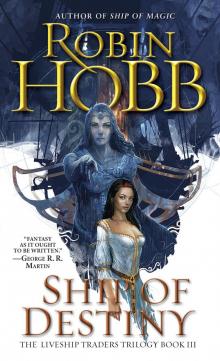 Ship of Destiny
Ship of Destiny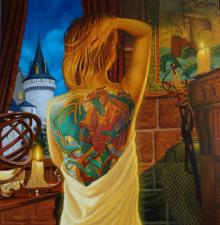 Golden Fool
Golden Fool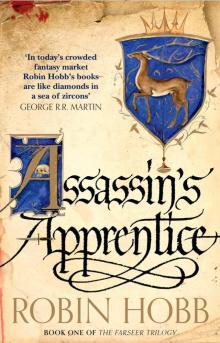 Assassins Apprentice
Assassins Apprentice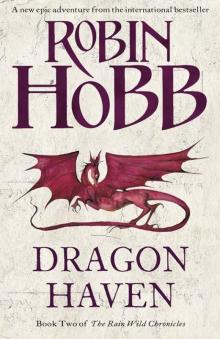 The Dragon Keeper
The Dragon Keeper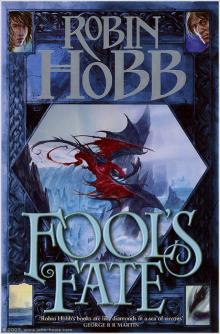 Fools Fate
Fools Fate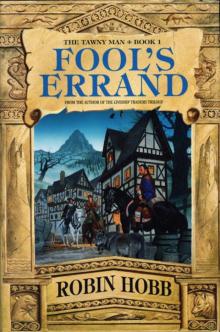 Fools Errand
Fools Errand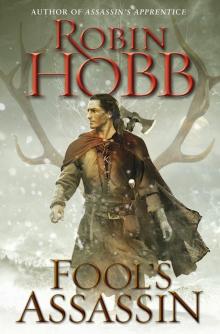 Fools Assassin
Fools Assassin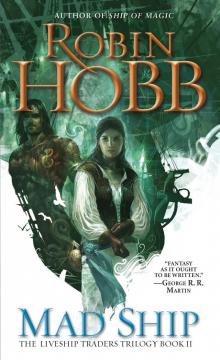 The Mad Ship
The Mad Ship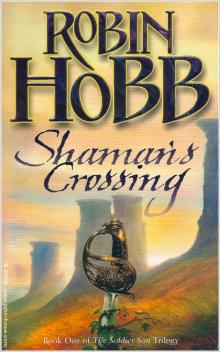 Shamans Crossing
Shamans Crossing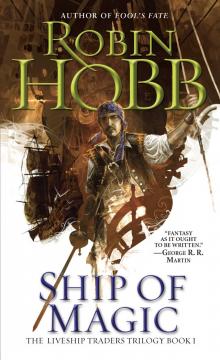 Ship of Magic
Ship of Magic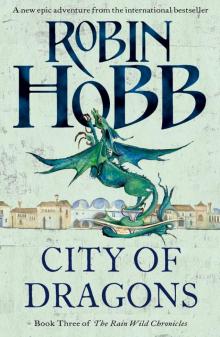 City of Dragons
City of Dragons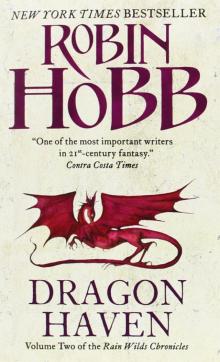 Dragon Haven
Dragon Haven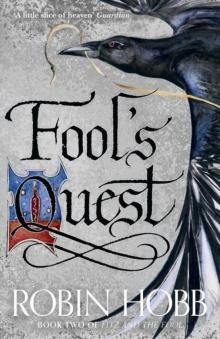 Fools Quest
Fools Quest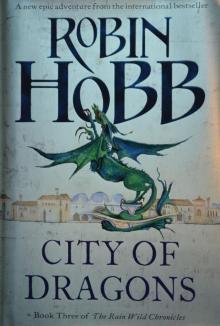 Blood of Dragons
Blood of Dragons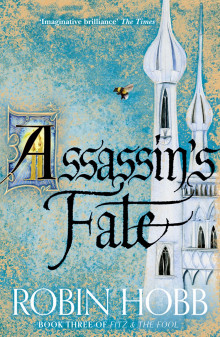 Assassin's Fate
Assassin's Fate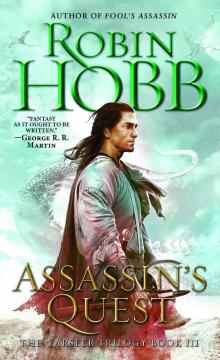 Assassins Quest
Assassins Quest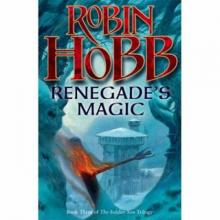 Renegades Magic
Renegades Magic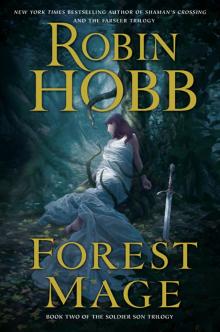 Forest Mage
Forest Mage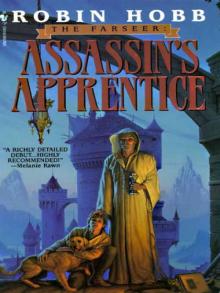 Assassin's Apprentice tft-1
Assassin's Apprentice tft-1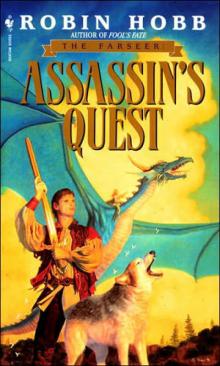 Assassin's Quest tft-3
Assassin's Quest tft-3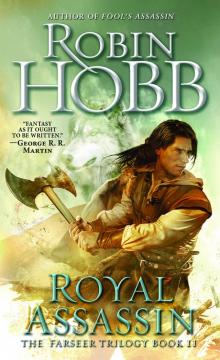 Royal Assassin
Royal Assassin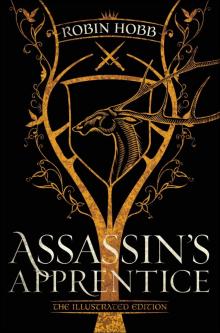 Assassin's Apprentice (The Illustrated Edition)
Assassin's Apprentice (The Illustrated Edition)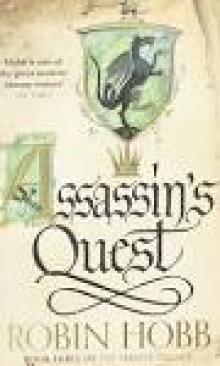 Assassin's Quest (UK)
Assassin's Quest (UK)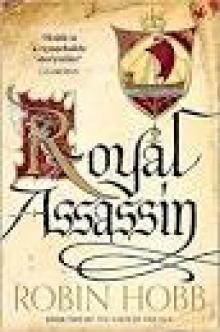 Royal Assassin (UK)
Royal Assassin (UK)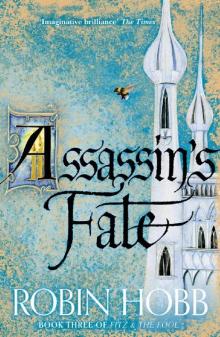 FF3 Assassin’s Fate
FF3 Assassin’s Fate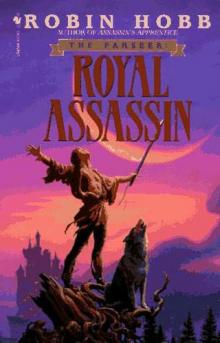 Royal Assassin tft-2
Royal Assassin tft-2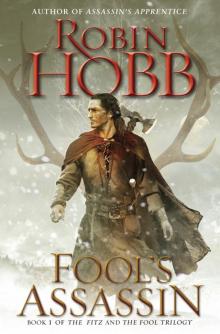 Fool’s Assassin: Book One of the Fitz and the Fool Trilogy
Fool’s Assassin: Book One of the Fitz and the Fool Trilogy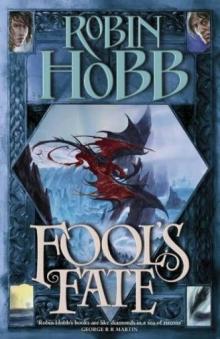 Fool's Fate ttm-3
Fool's Fate ttm-3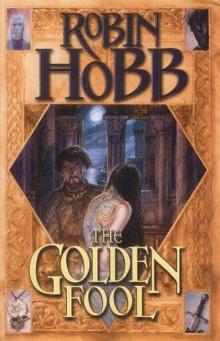 The Golden Fool ttm-2
The Golden Fool ttm-2 The Liveship Traders Series
The Liveship Traders Series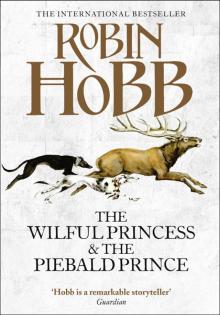 The Wilful Princess and the Piebald Prince
The Wilful Princess and the Piebald Prince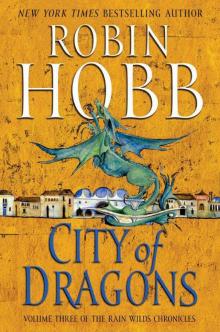 City of Dragons rwc-3
City of Dragons rwc-3 The Tawny Man 1 - Fool's Errand
The Tawny Man 1 - Fool's Errand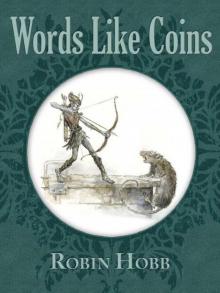 Words Like Coins
Words Like Coins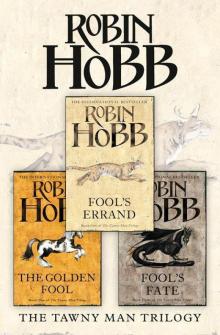 The Complete Tawny Man Trilogy Omnibus
The Complete Tawny Man Trilogy Omnibus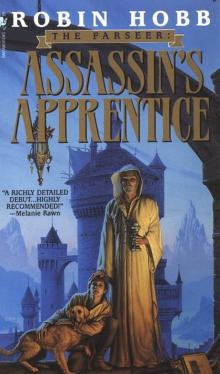 Farseer 1 - Assassin's Apprentice
Farseer 1 - Assassin's Apprentice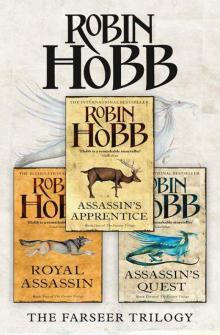 The Complete Farseer Trilogy Omnibus
The Complete Farseer Trilogy Omnibus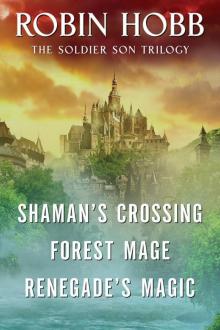 The Soldier Son Trilogy Bundle
The Soldier Son Trilogy Bundle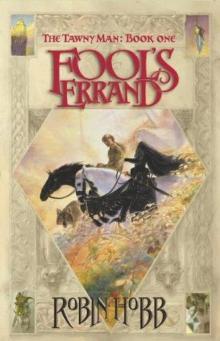 Fool's Errand ttm-1
Fool's Errand ttm-1 Blue Boots
Blue Boots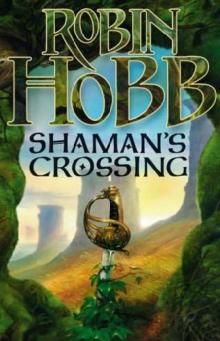 Shaman's Crossing ss-1
Shaman's Crossing ss-1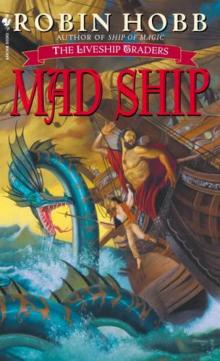 Mad Ship
Mad Ship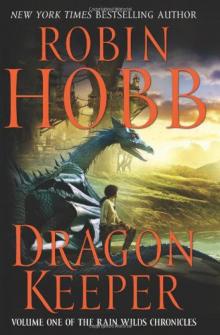 Dragon Keeper
Dragon Keeper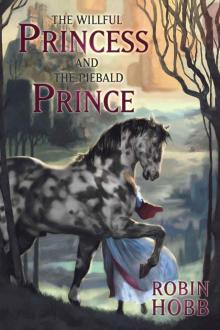 The Willful Princess and the Piebald Prince
The Willful Princess and the Piebald Prince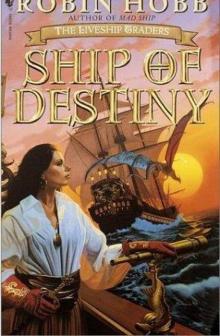 Ship of Destiny tlt-3
Ship of Destiny tlt-3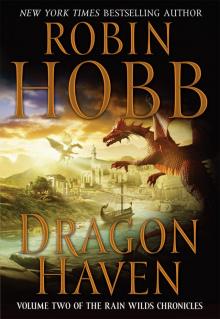 Rain Wild Chronicles 02 - Dragon Haven
Rain Wild Chronicles 02 - Dragon Haven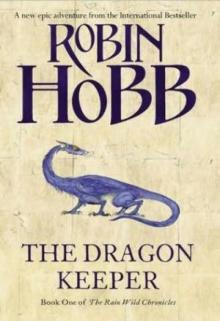 The Dragon Keeper trwc-1
The Dragon Keeper trwc-1 The Triumph
The Triumph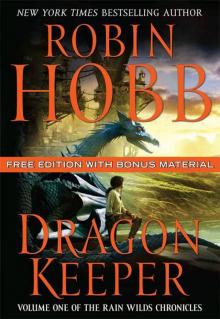 Dragon Keeper Free Edition with Bonus Material
Dragon Keeper Free Edition with Bonus Material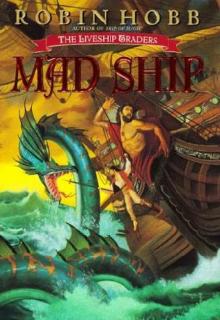 Mad Ship tlt-2
Mad Ship tlt-2 The Inheritance and Other Stories
The Inheritance and Other Stories Tawny Man 02 - Golden Fool
Tawny Man 02 - Golden Fool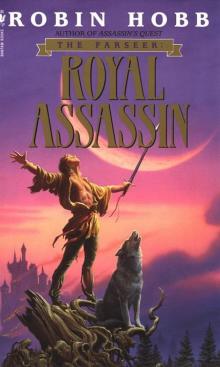 Farseer 2 - Royal Assassin
Farseer 2 - Royal Assassin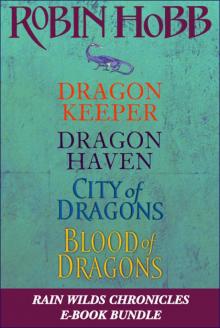 Rain Wilds Chronicles
Rain Wilds Chronicles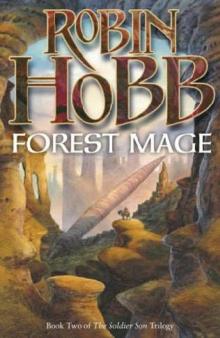 Forest Mage ss-2
Forest Mage ss-2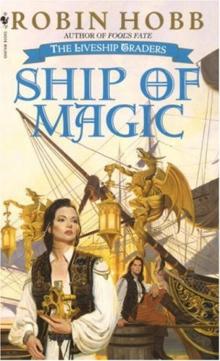 Ship of Magic lt-1
Ship of Magic lt-1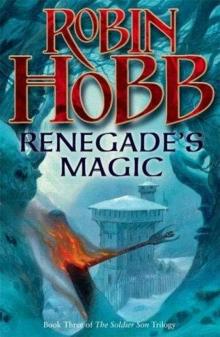 Renegade's Magic ss-3
Renegade's Magic ss-3